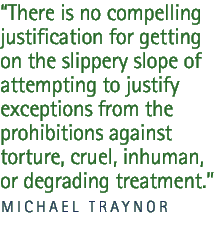The U.S. Senate voted 90-9 on Oct. 5, 2005 to endorse an amendment from Sen. John McCain (R-Ariz.) that puts limits on interrogation techniques of detainees in military custody and prohibits "cruel, inhuman or degrading treatment." If it becomes law, would the McCain amendment truly clarify how far U.S. interrogators can go in questioning detainees?

Michael Traynor
The overwhelming Senate vote for the McCain amendment … rejects the notion that secret and virtually unreviewable "findings" by the president as a kind of chief torturer are a substitute for established principles. The basic idea: "There are things we don't do. Period."
There is no compelling justification for getting on the slippery slope of attempting to justify exceptions from the prohibitions against torture, cruel, inhuman, or degrading treatment.

There is no necessary correlation between additional regulation and additional professionalism. In addition to moral principle, coercive techniques are not established as a superior method for effectively eliciting timely, truthful, and useful information, and they present serious counter risks of vengeful retaliation to every American who becomes a POW, corroding discipline, and undermining our nation's values.

Juliette Kayyem
The primary focus is military conduct: not surprising, given the sponsors, McCain (R-Ariz.), a torture victim in Vietnam, and Lindsey Graham (R-S.C.), a former military lawyer. It seems quite specific in limiting interrogations for those in military detention to the U.S. Army Field Manual. I am not an expert on the manual, and do not know the range of techniques, but when you compare it to the rest of the statute, it does seem pretty specific (though, I suspect, there will be disagreements on whether certain conduct allowed by the manual should be permissible).
The overall prohibition against cruel, inhuman or degrading treatment (CID) is, I suspect, a pretty big loophole for our intelligence agents. Determining what is CID basically amounts to a "shocks the conscience" test, which, at least my understanding, is less than torture, but also a balancing test that takes into account immediacy, harm, emergency, etc. In other words, it may amount to permitting pretty tough interrogations in the ticking time bomb scenario.
The other problems with the statute is that it doesn't require any reporting or political oversight or approval over any interrogations performed outside the Army Field Manual, which are clearly permissible by the language of the statute. So I'm not sure why some, including those with the Traynor viewpoint, would be so happy with the language of this statute.

David Rivkin
There is, of course, nothing inherently wrong with restating a vague and broad prohibition. There is a lot wrong with restating such a prohibition, as was done by McCain and Rep. Jane Harman (D-Calif.) [who was among the House members to introduce a bipartisan bill identical to the McCain amendment on Oct. 7, 2005,] in the current context and doing nothing more than that. I would not have such a reaction to these measures if they were accompanied by legislation that spelled out the permissibility of some coercive interrogation techniques, even if they were not fully enumerated [and that] emphasized both the need for and legitimacy of using coercive interrogation methods to obtain intelligence from unlawful enemy combatants, as distinct from POWs, etc. This, unfortunately, did not happen and there are no signs that it is going to happen.
The impact of McCain-Harman language is going to be the same as that of the wholesale punishments of military leaders, advocated by Sandy Levinson. They will cause the military to curtail all interrogations hellip; and would deprive us of all actionable intelligence. To put it mildly, this would not be a good thing. But what bothers me even more is that this dramatic result is being accomplished with the minimum of political accountability. I would, frankly, prefer if the proponents of banning all coercive interrogation techniques were to express their position openly, without any equivocation, and without resorting to such subterfuges as the reference to the Army Field Manual. This is important because the next time the U.S. suffers a devastating attack, which can be attributed to the utter lack of intelligence about our enemies' plans and intentions, it would be essential to assign properly political and bureaucratic responsibility for it.
